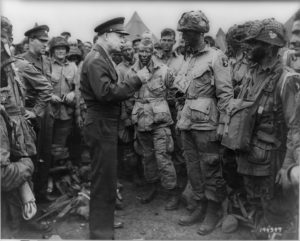“OK. We’ll go.”
Right then and right there, with those words, the order went out from the supreme commander of Allied forces in Europe.
The invasion of Europe was on.
General of the U.S. Army Dwight D. Eisenhower faced a terrible dilemma. The weather over the English Channel had been horrible. The invasion of France had been delayed once already. Hundreds of thousands of men had assembled and prepared in Great Britain for Operation Overlord.
Ike then caught a bit of a break. The weather was going to cooperate — more or less — on June 6, 1944. That’s when he decided to issue the order.
The men set out in ships. They boarded landing craft and hit the French coastline along five beachheads. American and British soldiers stormed four of them; Canadians stormed the fifth one.
Eisenhower had drafted two statements in preparation for that event, one to proclaim victory on the beach, the other to take full responsibility in case it went badly. He didn’t have to deliver the latter statement.
It has become fashionable in the present day to invoke Ike’s memory as we discuss the merits of the individuals seeking the U.S. presidency. Those who defend the current Republican presumptive nominee’s lack of government experience often cite Eisenhower’s own lack of such qualifications when he ran for president in 1952.
No, he didn’t have that kind of experience. All he did, though, was save the world from tyranny.
Eight years after saying simply, “OK. We’ll go,” the presidency became his for the taking.
So it was on this day 72 years ago that thousands upon thousands of young men followed their commander’s order.
May God bless them all.
